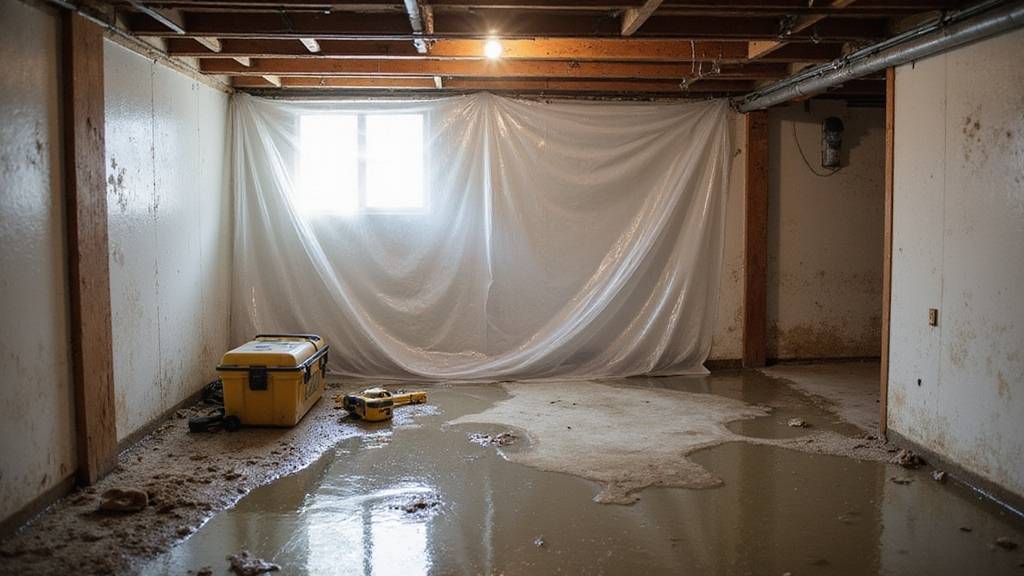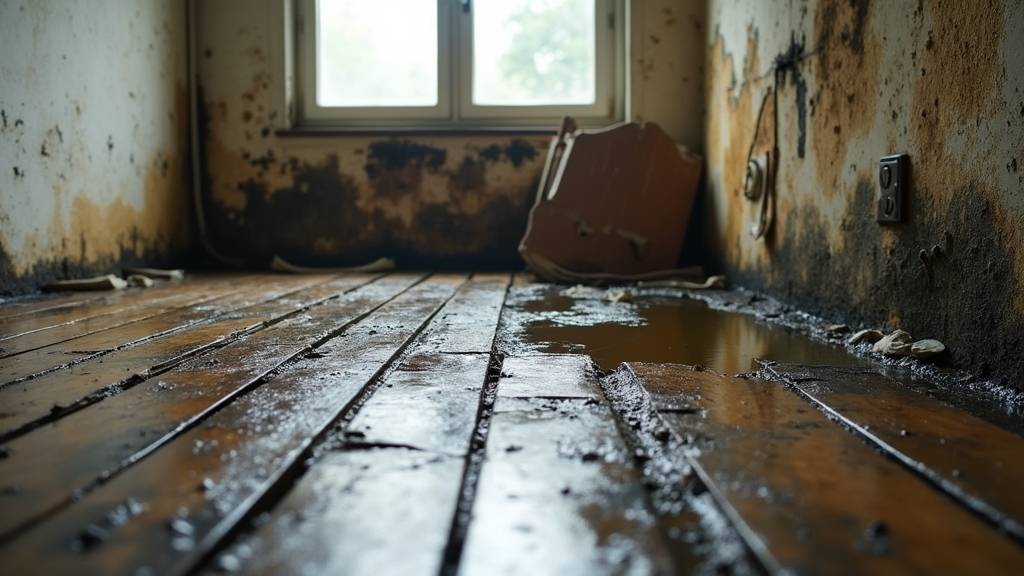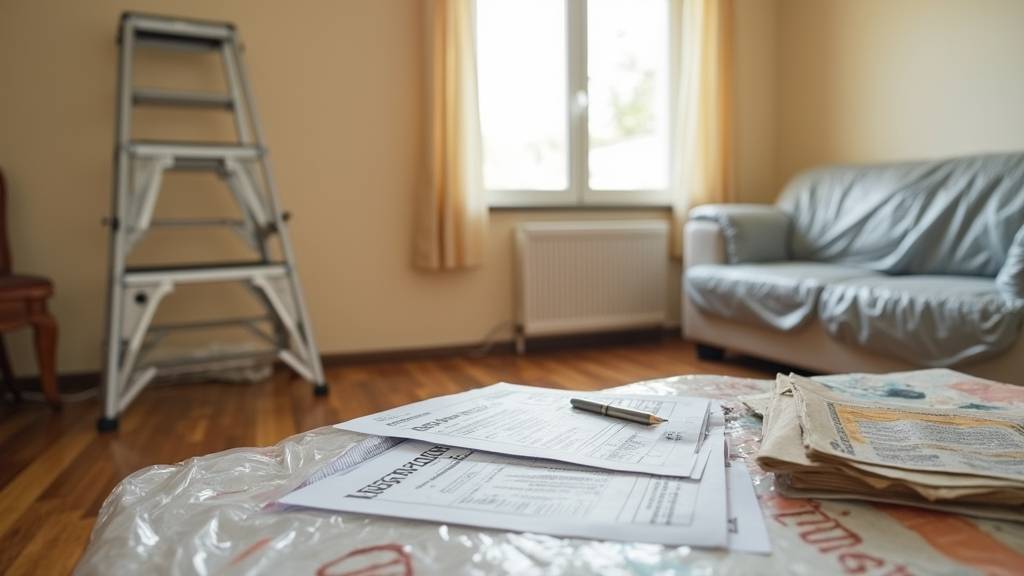Selling a house with water damage can be stressful and confusing. Many homeowners worry about what repairs are covered by their home insurance. Uncertainty about coverage can make it harder to sell your home quickly and for a good price.
You might think your insurance will pay for all water damage repairs. However, policies often only cover sudden or accidental damage, not long-term or neglected issues.
This gap can leave you facing big bills or unhappy buyers. Home insurance usually covers water damage that is sudden and accidental, not ongoing or preventable issues.
You need to understand your policy details and document the damage carefully. Knowing what is covered will help you make smart decisions when selling. This blog will guide you through what home insurance covers when selling a water-damaged house.
Key Takeaways
- Home insurance typically covers sudden and accidental water damage, such as burst pipes or appliance leaks, but not gradual leaks or neglect.
- Damage that occurred before policy inception or due to poor maintenance is usually excluded from coverage, affecting claim approval.
- Insurance may reimburse repairs to walls, floors, and other affected areas if the water damage was unexpected and properly documented.
- Mold remediation from covered water damage may be partially included, but most policies have low payout limits or require extra endorsements.
- Full disclosure of water damage and repair documentation is required when selling, and incomplete repairs may impact both insurance claims and the sale process.
Understanding Water Damage in Real Estate Transactions

Water damage can affect the value and safety of a property. Buyers should know how water issues impact real estate deals. If you ignore water damage, you may face costly problems later. Understanding selling a house as-is can help buyers navigate repairs or negotiations more effectively. Check if the property is in a flood zone. Properties in flood zones need special insurance and may have higher risks.
This can lower the property’s value and make it harder to sell. Look for signs like water stains, mold, or musty smells in basements. These signs can mean ongoing water problems. If you find any, you may need to pay for repairs. Always review the seller’s disclosure for any history of water damage. If there is a past issue, ask for details and proof of repairs. You can use this information to negotiate the price or request repairs before buying.
If you find water damage, consider adding special conditions to your offer. Conditional offers can protect you if new issues appear before closing. Proper inspection and documentation are essential to understanding the full extent of water damage severity, which can influence your decision. Careful checks help you make a safer investment.
Types of Water Damage Typically Covered by Home Insurance
When you review your home insurance policy, you’ll notice that it typically covers water damage caused by sudden burst pipe incidents and accidental appliance leaks. Insurers recognize these events as unpredictable and unpreventable, so they usually qualify for coverage.
You should understand the specific scenarios your policy includes to avoid surprises when filing a claim. Additionally, it’s important to note that covering houses in any condition, including those with fire damage or needing repairs, is often part of what some local buyers, like We Buy Houses in West County, MO, can assist with during a sale.
Sudden Burst Pipe Incidents
Sudden burst pipe incidents are usually covered by standard home insurance. Insurance companies see burst pipes as unexpected accidents. This means you may get help with repair costs and water damage.
Coverage often includes fixing the pipe and repairing your home or belongings. If you live in a flood zone, know that flood damage is different from burst pipe damage. Insurance policies treat these two types of damage separately.
Insurers may check how often burst pipes occur in your area when setting your premium. Regular plumbing maintenance can help you qualify for coverage. If you act quickly on plumbing problems, your insurance costs may stay lower.
Accidental Appliance Leaks
Appliance leaks often cause water damage in homes. Insurance usually covers sudden leaks from appliances like washing machines or water heaters. This coverage applies if the leak happens unexpectedly and is not from neglect.
If water escapes from an appliance and damages your property, you can usually file an insurance claim. The policy covers repairs to walls, floors, and other affected areas. However, insurance does not cover damage from slow leaks or poor maintenance.
Homeowners should document the leak and act quickly to prevent more damage. If you respond fast, you may increase your chances of a successful claim. Always read your insurance policy to understand what is covered.
Common Exclusions in Home Insurance Policies

When reviewing your policy, you’ll notice insurers often exclude coverage for gradual damage, pre-existing issues, and losses caused by neglected maintenance. These exclusions mean you can’t claim for slow leaks, damage that existed before coverage began, or problems resulting from failure to upkeep your property. Understanding these limitations helps you avoid unexpected claim denials and keeps your coverage expectations realistic.
Additionally, damage related to damaged asbestos materials may not be covered if the damage is deemed to have resulted from deterioration or improper handling. Recognizing insurance policy exclusions ensures you are better prepared when facing water-related property issues.
Gradual Damage Limitations
Homeowner insurance often does not cover gradual water damage. Most policies only cover sudden events, like a burst pipe. Damage from slow leaks or poor drainage is usually excluded.
Insurers may deny claims if your property slopes toward your home and causes repeated water issues. If inspectors find you did not follow local building codes, you could be held responsible. This can also create legal problems for you.
Before selling, you should check for ongoing water problems. Address any issues right away to avoid coverage disputes. Taking these steps helps prevent unexpected costs during the sale.
Pre-Existing Conditions Exclusion
A pre-existing conditions exclusion means home insurance will not cover damage that happened before your policy began. This rule protects insurance companies from claims on old, unresolved problems. If you try to claim for damage that was already there, your insurer will likely deny coverage.
Insurers often check when the damage first happened. If the damage started before your policy, your claim will probably be denied. Homeowners cannot use insurance to fix issues they knew about before coverage.
If the damage date is unclear or not properly documented, coverage is usually denied. Documented minor repairs from before your policy may reduce what the insurer pays. Always check your policy and keep records of repairs to avoid surprises.
Maintenance Negligence Clauses
If you do not maintain your home, insurance may not cover damage. Most policies have maintenance negligence clauses that exclude certain claims. Insurers expect you to handle basic repairs and upkeep.
Plumbing problems caused by neglect, like ignoring drips or rust, may lead to denied claims. This rule also applies to roof damage, blocked gutters, or unsealed windows. Insurance covers sudden accidents, not slow, preventable damage.
If you want to sell a house with water damage, you need proof of regular maintenance. Without records, the insurer may say the damage was preventable. You could then be responsible for the repair or replacement costs.
Sudden vs. Gradual Water Damage: What Insurers Look For

Insurers check if water damage happened suddenly or over time. Sudden damage, like from a burst pipe, is usually covered. Gradual damage from slow leaks is often not covered.
They review your claim details, photos, and any maintenance records. If the damage is from neglect, your claim may be denied. Proper maintenance can help support your claim. Additionally, insurance companies may look for signs of preventative maintenance to determine if the damage was avoidable.
If you live in a flood zone, standard home insurance likely will not cover flood damage. You will need special flood insurance for that. This type of insurance can increase your premiums.
Understanding these rules helps you know what insurance will pay for. It can also help you avoid denied claims when selling your house. Always read your policy to know your coverage limits.
Additionally, being aware of coverage exclusions related to gradual water damage can prevent surprises during claims processing.
The Claims Process for Water Damage Repairs
When water damage strikes, you’ll need to file a claim with your insurer as soon as possible, providing detailed documentation and evidence of the incident. An adjuster will then visit your property to inspect the damage and determine the extent of coverage under your policy.
Once the assessment is complete, your insurer will approve or deny the claim based on their findings and policy terms. Proper documentation and understanding of insurance claim procedures can help expedite the process and ensure appropriate coverage.
Filing a Water Damage Claim
If you find water damage in your home, you should file an insurance claim as soon as possible. Quick action helps protect your property and your claim. Insurance companies expect you to report damage right away.
Take clear photos and videos of all affected areas. Include images of any past flooding or mold problems. Detailed records help prove your claim.
Check your home insurance policy for any exclusions. If previous water damage is not covered, your claim may be denied. Policies often have rules about recurring issues.
Contact your insurer immediately after you notice the damage. Early notification can prevent delays in the claims process. Insurers may reduce payments if you wait too long.
Keep all receipts for cleanup and repairs. If you hire professionals for mold removal, save those records too. These documents support your claim and may help you get reimbursed.
Adjuster Assessment and Approval
An adjuster will review your water damage claim to decide if it is covered. The adjuster looks at the damage and checks if it fits your policy. You must give clear documents like photos, receipts, and repair quotes.
The adjuster may visit your property to inspect the damage. You should provide easy access and answer questions. If the claim is unclear, the adjuster might ask for more details.
After the inspection, the adjuster reviews your paperwork and coverage. If your claim matches the policy, it may be approved. If not, it could be denied or need more information.
You should stay organized and submit all documents on time. If you are unsure about your policy, review it before the visit. This helps avoid delays in your claim process.
How Pre-Existing Damage Affects Your Coverage
Pre-existing damage can affect what your insurance will cover. Insurance usually does not pay for damage that happened before your policy started. You must keep your property in good condition to avoid denied claims.
If an adjuster finds old damage, your claim may be denied. Accurate records, such as photos and receipts, help show when damage occurred. Insurers rely on these documents to check the timing of the problem.
Home insurance does not cover flood damage. You need a separate flood insurance policy for floods. Always check your policy for exclusions and limits.
Inspections can reveal earlier issues you may not notice. Documentation supports your claim and helps prove your case. Policy rules can restrict payouts for pre-existing problems. Additionally, claims process can be complex when pre-existing damage is involved.
Mold Remediation and Insurance Limitations
Home insurance often limits coverage for mold cleanup. If mold is caused by a covered event, insurance may help pay. Mold from ignored leaks or poor maintenance is usually not covered.
Most policies set a low maximum payout for mold, often between $1,000 and $5,000. Insurers sometimes offer extra coverage for mold at a higher cost. You should check your policy for these limits and any extra requirements.
If you want better protection, consider adding an endorsement to your policy. Always read your insurance details carefully to know what is and is not covered. Contact your agent if you have questions about mold coverage. Understanding insurance limitations can help you prepare for potential water damage issues. Being aware of coverage restrictions ensures homeowners are better prepared for water-related damages.
Impact of Water Damage Claims on Home Value
When you file a water damage claim, you’re required to disclose this history to potential buyers, which can affect their perception of your home’s condition. Appraisers often factor in past water damage and repairs, leading to possible downward adjustments in your property’s value. Understanding these impacts helps you expect challenges during a future sale.
Additionally, local North County, MO buyers may be more familiar with water damage issues in the area, potentially influencing their valuation and willingness to pay full price. Being aware of disclosure requirements related to water damage can also help you navigate the selling process more confidently.
Disclosure Requirements for Sellers
If you are selling a house with past water damage, you must tell buyers about it. Laws require you to share all known water issues. This is important because it affects your home’s value and attracts serious buyers.
Buyers and their agents will ask about past water problems, especially if the home is in a flood zone. You should be honest to avoid legal trouble or canceled sales. Your honesty also helps buyers decide about future insurance needs.
You must keep records of all water damage and the repairs done. Providing receipts and repair reports gives proof of your efforts. Always share if the home is in a flood zone.
If you made insurance claims for water damage, you need to report them. Buyers will want to know about higher or expected insurance costs. Sharing this information builds trust and avoids problems after the sale.
Appraisal Adjustments After Claims
A water damage claim can lower your home’s appraised value. Appraisers check your property’s claim history and see water damage as a risk. Even one claim may affect your home’s worth.
Insurance does not always restore your home to its full value. Appraisers consider the chance of future problems, even if repairs look complete. The stigma of water damage can remain after repairs.
Claim reports use terms like “settlement” or “residual damage” that may concern appraisers. These words can signal possible issues, even if the work is finished. If your home had water damage, your appraisal will likely reflect it.
If you keep clear records and are honest, it may help your case. However, expect the appraisal to note any past water damage. Proper documentation can give appraisers a better view of your repairs.
Selling “As-Is” and Insurance Considerations
Selling a water-damaged house “as-is” can speed up the sale and reduce repair responsibilities. However, this choice creates insurance challenges for both sellers and buyers. Insurance issues may affect the sale process and the home’s appeal.
Your current home insurance may not cover future water problems once damage is disclosed. The insurance company might refuse to renew your policy or raise your premiums. If the damage is severe, buyers may find it hard to get coverage. Proper assessment of water damage is essential to understand the true extent of repairs needed and how insurance might respond. Additionally, understanding the local real estate market expertise can help sellers navigate insurance concerns more effectively.
Buyers may want a home warranty, but these often have limited protection for water damage. If the home lacks insurance, lenders might not approve a mortgage. These factors can make selling a water-damaged home more complicated.
Disclosing Water Damage to Potential Buyers
You must tell buyers about any water damage you know about. Most states require this by law. This helps avoid legal problems later.
You should clearly explain where the damage is, how bad it is, and what caused it. Let buyers know about any repairs you made. If you fixed anything, share those details.
Buyers often ask about leaks, flooding, or mold. You should say if the problem came from weather, plumbing, or something else. Tell buyers if you took steps like mold removal or better drainage.
Full disclosure builds trust with buyers. It also protects you during the sale. If you are honest, the process goes more smoothly.
Working With Insurance Adjusters During the Sale
When selling a home with water damage, you may need to work with insurance adjusters. They review your insurance policy to see what is covered. You must provide clear information about the damage and repairs.
Homeowners should collect all repair estimates, receipts, and photos of the damage. These documents help prove the timeline and extent of repairs. If you keep records organized, the process is smoother.
You should answer the adjuster’s questions quickly and honestly. If you are unsure about your policy, review it or ask your insurer for details. Every conversation with the insurer or adjuster should be written down.
If you follow these steps, you can avoid delays or confusion. This approach helps both you and the buyer during the sale.
Required Repairs Before Closing the Deal
You must fix required repairs before closing the deal. Lenders and buyers will check if the home meets safety and value standards. If there are unresolved issues, the deal may not move forward.
Focus on fixing water damage, structural problems, and mold. If your insurance covers repairs, contact your insurer for help. Make sure all important repairs are done before closing.
Keep receipts and proof of all repairs. Buyers and lenders often ask to see this information. If you do not provide proof, the sale could be delayed.
How to Maximize Your Insurance Payout
To maximize your insurance payout, you need to show proof and follow proper steps. Take clear photos of the water damage before and after any repairs. Save all estimates, receipts, and records of emergency work you paid for.
Your insurance company will look closely at your claim details. Read your policy to know exactly what is covered and what is not. If you think the first offer is too low, you should ask for more.
Use licensed professionals for repairs if possible. Keep copies of all letters and emails with your insurance company. If you pay attention to these details, you can get the best payout without risking higher future premiums.
Tips for Choosing Future Insurance After a Water Damage Claim
If you have made a water damage claim, insurance companies might see you as a higher risk. To get future coverage, compare policies from several companies. Do not simply renew your current policy without checking other options.
You should ask each insurer how your past claim will affect your premiums. Be honest about your property’s history and any steps you have taken to prevent more damage. If your property is in a flood zone, this can affect your coverage options and costs.
When choosing a new policy, look at important factors. These include your claim history, flood zone status, and policy exclusions. Also consider deductible options and the reputation of the insurance company.
Use the table below to help you compare these factors. If you review each part carefully, you can find better coverage for your needs. This approach helps you make a smart decision for future protection.
Conclusion
If you plan to sell a water-damaged home, knowing your insurance coverage is important. If you understand your policy and keep good records, you can avoid unwanted surprises. If your claim is approved, you may cover repair costs and protect your investment.
If insurance does not cover all the damage, selling for cash may be a good option. If you want a fast and simple solution, we buy houses for cash in any condition. This can help you avoid delays and extra expenses from water damage repairs.
If you are ready to sell your home, Freedom Path Investors can help. If you contact us today, we will give you a fair cash offer. Let us make your selling process easy and stress-free.







